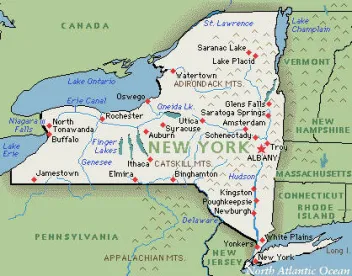Decision binding on all local state taxing authorities
The Appellate Division of the New York courts has affirmed that a local governmental taxing authority must notify a solar project developer within 60 days from when the developer first notifies the authority of its plans to construct a solar facility that the authority intends to require the developer to enter into a Payment in Lieu of Taxes, or PILOT Agreement, or the taxing authority foregoes its right to require a PILOT Agreement from the project developer. Matter of Laertes Solar, LLC v Assessor of the Town of Harford (2020 NY Slip Op 02302).
Most cities, counties, school districts, and other local government authorities in New York have authority to tax real property. Local governments often use their taxing power to assess solar energy facilities being developed in their jurisdictions as “improvements” to the property.
As part of New York’s concerted effort to reduce greenhouse gas emissions, the state enacted Section 487 of New York’s Real Property Tax Laws (RPTL). RPTL §487 exempts solar, wind, and certain other energy systems (as defined in the law) from property taxes for a period of 15 years. The law was designed to encourage the development of clean energy resources by providing project developers and property owners with certainty that their taxes will not increase for 15 years if they install these clean energy systems.
RPTL §487’s 15-year tax exemption applies to any solar and wind energy system constructed in New York. The law, however, gives taxing authorities an opportunity to affirmatively opt out of the law, referred to as an “Opt-Out Election.” If a taxing authority opts out of the law, the solar facility will then be subject to property taxes absent some other available (e.g., religious, educational, etc.) tax exemption. The Opt-Out Election may be exercised by the local taxing authority passing a law or ordinance to that effect and then filing it with the New York Department of Taxation and Finance (the Department) and the York State Energy and Research Development Authority (NYSERDA). The filing is intended to put developers and property owners on notice of the taxing authority’s Opt-Out Election. To be effective, the taxing authority must exercise the Opt-Out Election and publicly post it before a developer begins construction of the project.
Where a local government entity does not affirmatively opt out of the law, then the solar energy system is eligible to receive a 15-year tax exemption. However, RPTL §487(9) provides the local taxing authority with the ability to require the owner of a tax-exempt eligible project to enter into a PILOT agreement within 60 days from when the project owner first notifies the authority that it intends to install a solar facility. Under a PILOT Agreement, the solar project owner agrees to make payments to the local entity in lieu of paying taxes. The agreements are negotiated between the parties and typically run for 15 years. Payments under the agreement may not exceed what the solar project owner would have paid had the project been subject to taxes.
In Laertes, Laertes Solar, LLC, a third-party solar project developer, had entered into an agreement with Cornell University under which Laertes would build, own, and operate a solar project in Cortland County on property controlled by Cornell University. Power from the project would be used by Cornell to meet the university’s energy needs and satisfy its renewable energy targets. Prior to Laertes commencing construction on the project, the Dryden Central School District adopted a resolution opting out of RPTL §487. The school district filed the resolution with the Department, but failed to file it with NYSERDA as required under the law.
The town of Harford, as tax assessor for the Dryden Central school district, also placed the solar project on its tax rolls and assessed the facility for the school district. Laertes, in turn, filed with the Town for a 15-year tax exemption under RPTL §487 for its facility. The exemption request was denied by the town.
Laertes challenged the tax assessment by filing a declaratory judgment action under Article 78 of New York’s civil rules against the town of Harford and the Dryden Central school district in the Supreme Court, Third Department. Cornell University intervened on behalf of Laertes.
In its decision, the Appellate Division of the Third Department affirmed the lower NY Supreme Court’s ruling that the school district had not complied with the statutory requirements for opting out of RPTL §487 because it failed to file its Opt-Out Election with NYSERDA. The court found that publication of the Opt-Out Election was intended to provide solar developers with a statewide registry of which local governments had and had not opted out of the law so that developers could make informed decisions regarding where to locate their projects. The court found that a taxing authority cannot deprive property owners of the tax exemption afforded them under RPTL §487 unless the taxing authority has complied with the opt-out requirements of the law.
The court also affirmed the lower court’s holding that the town and school district had failed to timely notify Laertes of its intent to require the solar developer to enter into a PILOT agreement. The town gave notice to Laertes more than 60 days after the developer had provided the town with written notice of its intent to develop the solar facility. The court held that local taxing authorities are strictly bound by the 60-day deadline for requiring a developer to enter into a PILOT agreement. Having failed to comply with the 60-day requirement, the court ruled that the school district could not demand a PILOT agreement from Laertes. Since the project qualified as a solar energy system under RPTL §487, the court affirmed that Laertes was entitled to a 15-year tax exemption.
The Laertes court made clear that RPTL §487 was enacted for the benefit of solar project developers and owners. The Appellate Division affirms that the notice provisions of RPTL §487 will be strictly enforced by the courts against local taxing authorities, including the requirement for the taxing authority to post notice of its Opt-Out Election with the Department and NYSERDA, and act within the 60-day window provided it to require a project developer to enter into a PILOT agreement. The court affirms that a taxing authority cannot deprive a project owner of its right to a 15-year tax exemption absent complying with these requirements.
The decision is notable as it is the first time that an Appellate Division court has addressed either of the notice provisions contained in the statute. In doing so, the court held that the notice provisions are material requirements of the law and will be strictly enforced in favor of the project owner/developer.
As the only pronouncement of an intermediate court on these matters, the Laertes decision constitutes stare decisis and is binding on trial courts in all Departments, not just courts in the Third Department. The decision thus constitutes the law of the state and must be applied on a consistent basis by all local state taxing jurisdictions. The Appellate Division decision provides solar and wind project developers, renewable energy users/property owners and local governmental authorities with uniform guidance and a clear understanding of what a local governmental authority must do, and when, to deny an eligible solar or wind energy developer the statutory 15-year tax exemption granted it under RPTL §487.



 />i
/>i

